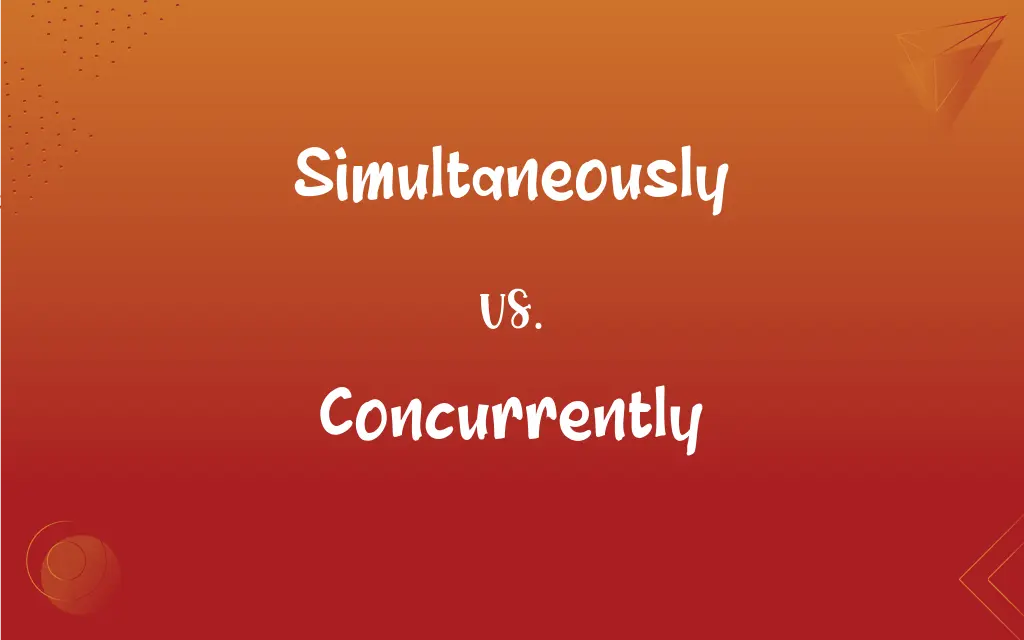Simultaneously vs. Concurrently: What's the Difference?
Edited by Aimie Carlson || By Janet White || Updated on October 12, 2023
Both "simultaneously" and "concurrently" denote things happening at the same time, but "simultaneously" emphasizes exactness, while "concurrently" can imply overlap or coordination.

Key Differences
"Simultaneously" is derived from the Latin word "simul," meaning "at the same time." It generally refers to events, actions, or processes that occur at the exact same moment. When one uses "simultaneously," they are highlighting the precise moment two or more occurrences align in time. For example, two fireworks that explode in the sky at the very same instant happen simultaneously.
"Concurrently," while similar in many ways to "simultaneously," can have a broader application. It can indicate events that overlap in time, not just events that happen at the exact same moment. For instance, two events or processes that run together for a period, even if they started or ended at different times, can be said to occur concurrently.
One might consider "simultaneously" as a subset of "concurrently." While all simultaneous events are concurrent, not all concurrent events are simultaneous. "Concurrently" may allow for a slight time overlap, whereas "simultaneously" is more stringent about the exactness of timing.
In certain contexts, "concurrently" also holds legal or formal connotations, as in sentences dealing with serving concurrent prison sentences or having concurrent responsibilities. "Simultaneously," while also versatile, might not be the first choice in such legal or formal contexts.
Comparison Chart
Meaning
Occurring at the exact same moment
Happening at the same time or overlapping
ADVERTISEMENT
Emphasis
Precision in timing
Time overlap or coordination
Application
General
General, sometimes legal or formal
Flexibility in Time
Requires exact timing
Allows for some overlap
Origins
Derived from Latin "simul"
Relates to "concur" meaning to run together
Simultaneously and Concurrently Definitions
Simultaneously
Occurring at the exact same time.
The lights turned off and the music began simultaneously.
ADVERTISEMENT
Concurrently
In conjunction or coordination.
The two projects were developed concurrently.
Simultaneously
Marked by coincidental timing.
The two cars honked simultaneously.
Concurrently
Overlapping in duration.
He held three concurrent jobs.
Simultaneously
Happening together with precision.
They jumped into the pool simultaneously.
Concurrently
Happening or existing at the same time.
The two meetings ran concurrently.
Simultaneously
Aligning perfectly in time.
Both singers hit the high note simultaneously.
Concurrently
In parallel or tandem.
The systems operated concurrently to achieve efficiency.
Simultaneously
Exhibiting synchronized occurrence.
The dancers moved simultaneously, creating a beautiful pattern.
Concurrently
Coinciding in time.
Several festivals occurred concurrently in the town.
Simultaneously
Happening, existing, or done at the same time.
Concurrently
Happening, existing, or done at the same time as something else
Dealing with concurrent crises.
Simultaneously
(Mathematics) Containing variables for which there are values that can satisfy all the equations
Simultaneous equations.
Concurrently
Meeting or tending to meet at the same point; convergent
Concurrent lines.
Simultaneously
Occurring at the same time.
Concurrently
Being in accordance; harmonious
Are these decisions concurrent with university policy?.
Simultaneously
At the same instant;
They spoke simultaneously
Concurrently
In a concurrent manner; at the same time
Concurrently
With concurrence; unitedly.
Concurrently
Overlapping in duration;
Concurrently with the conference an exhibition of things associated with Rutherford was held
Going to school and holding a job at the same time
FAQs
Can "concurrently" be used in legal contexts?
Yes, "concurrently" can be used to describe, for instance, concurrent prison sentences or simultaneous responsibilities.
Do "simultaneously" and "concurrently" mean the same thing?
Essentially, both refer to things happening at the same time, but "simultaneously" emphasizes exact timing, while "concurrently" suggests overlap or coordination.
In which context is "simultaneously" most commonly used?
"Simultaneously" is often used to describe events or actions that occur at the exact same moment.
Is it correct to say two events happened "simultaneously" if one started a minute before the other?
No, "simultaneously" suggests that they happened at the exact same moment.
Can "simultaneously" be considered a subset of "concurrently"?
In a way, yes. All simultaneous events are concurrent, but not all concurrent events are strictly simultaneous.
How does "concurrently" relate to the word "concur"?
Both words share a root; "concur" means to agree or happen together, reflecting the overlapping nature implied by "concurrently."
If two events happen back-to-back, can they be described as happening "concurrently"?
Not ideally. "Concurrently" suggests that the events overlap in some way. Back-to-back events would be sequential, not concurrent.
Is it correct to say two tasks were completed "simultaneously" if they were finished at the same time but started at different times?
Yes, since "simultaneously" refers to the exact moment of completion in this case.
Which word would be more appropriate for events that overlap but don't start or end at the same time?
"Concurrently" would be the more appropriate choice in this context.
Is it common to use "concurrently" in formal writing or reports?
Yes, "concurrently" can be used in formal contexts to indicate things happening in parallel or at the same time.
Which word has a broader application?
"Concurrently" has a broader application since it can denote both overlapping and exact timing.
Which term implies a stricter sense of timing?
"Simultaneously" implies a stricter sense of timing.
Does "simultaneously" come from Latin?
Yes, it's derived from the Latin word "simul," meaning "at the same time."
Can "simultaneously" and "concurrently" be used interchangeably?
Often they can, but not always. "Simultaneously" emphasizes exact timing, while "concurrently" allows for broader overlapping.
Is "simultaneous" an adjective form of "simultaneously"?
Yes, "simultaneous" is the adjective form, and "simultaneously" is its adverbial counterpart.
Can "concurrently" also mean "with agreement"?
While its primary meaning relates to timing, "concurrently" can also imply agreement or cooperation, especially in formal contexts.
Can two athletes finishing a race at the same time be described as finishing "simultaneously"?
Yes, if they crossed the finish line at the exact same moment, they finished "simultaneously."
Can "concurrently" be used to describe two overlapping periods of time?
Absolutely. "Concurrently" is suitable to describe events or periods that overlap.
In computing, can "concurrently" be used to describe processes running at the same time?
Yes, in computing, processes or threads running at the same time, even if not precisely synchronized, can be described as running concurrently.
If two meetings are scheduled at the same time, can it be said they are happening "concurrently"?
Yes, the two meetings would be occurring concurrently.
About Author
Written by
Janet WhiteJanet White has been an esteemed writer and blogger for Difference Wiki. Holding a Master's degree in Science and Medical Journalism from the prestigious Boston University, she has consistently demonstrated her expertise and passion for her field. When she's not immersed in her work, Janet relishes her time exercising, delving into a good book, and cherishing moments with friends and family.
Edited by
Aimie CarlsonAimie Carlson, holding a master's degree in English literature, is a fervent English language enthusiast. She lends her writing talents to Difference Wiki, a prominent website that specializes in comparisons, offering readers insightful analyses that both captivate and inform.































































